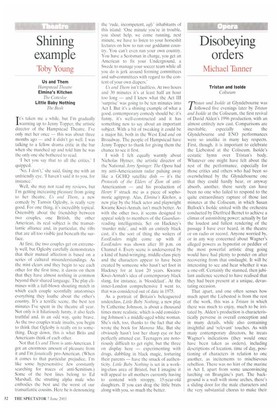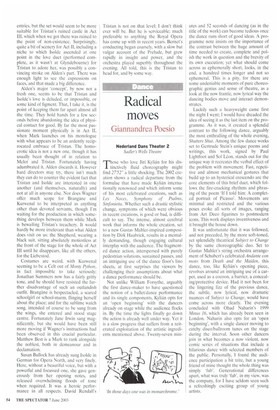Disobeying orders
Michael Tanner
Tristan and Isolde Coliseum pistan und Isolde at Glyndebourne was / followed five evenings later by Tristan and Isolde at the Coliseum, the first revival of David Alden's 1996 production, with an almost entirely new cast. Comparisons are inevitable, especially since the Glyndebourne and ENO performances were so unalike in many key respects. First, though, it is important to celebrate the Liebestod at the Coliseum, Isolde's ecstatic hymn over Tristan's body. Whatever one might have felt about the rest of the performance, especially for those critics and others who had been so overwhelmed by the Glyndebourne one that they could hardly hear, or anyway absorb, another, there surely can have been no one who failed to respond to the quite extraordinary rapture of those last minutes at the Coliseum, in which Susan Bullock's Isolde united with the orchestra conducted by Dietfried Bernet to achieve a climax of astonishing power; actually by far the loudest and fullest rendering of the passage I have ever heard, in the theatre or on radio or record. Anyone worried by, or in any way concerned about Wagner's alleged powers as hypnotist or peddler of the most powerful artistic drug going would have had plenty to ponder on after recovering from that onslaught. It will be interesting to see and hear whether it was a one-off. Certainly the stunned, then jubilant audience seemed to have realised that they had been present at a unique, devastating occasion.
That apart, and one often senses how much apart the Liebestod is from the rest of the work, this was a Tristan in which there was much to enjoy, much to be irritated by. Alden's production is characteristically perverse in overall conception and in many details, while also containing insightful and 'relevant' touches. As with many contemporary directors, he treats Wagner's indications (they would once have been taken as orders), including descriptions of location, time of day, positioning of characters in relation to one another, as incitements to mischievous rebellion. There was no hint of the marine in Act 1, apart from some unconvincing lurching on Brangane's part. The background is a wall with stone arches, there's a sliding door for the male characters and the very substantial chorus to make their entries, but the set would seem to be more suitable for Tristan's ruined castle in Act III, which when we got there was ruined to the point of non-existence. Surprisingly, quite a bit of scenery for Act II, including a niche to which Isolde ascended at one point in the love duet (performed complete, as it wasn't at Glyndebourne) for Tristan to adore her, was possibly a convincing stroke on Alden's part. There was enough light to see the expressions on faces, and that made a big difference.
Alden's major 'concept', by now not a fresh one, seems to be that Tristan and Isolde's love is deluded, or impossible, or some kind of figment. That, I take it, is the point of keeping them far apart almost all the time. They hold hands for a few seconds before abandoning the idea of physical contact for good. By far the most passionate moment physically is in Act II, when Mark launches on his monologue with what appears to be an ardently reciprocated embrace of Tristan. The homoerotic idea is not a new one, though it has usually been thought of in relation to Melot and Tristan. Fortunately having adumbrated it, Alden discards it. However hard directors may try, there isn't much they can do to counter the evident fact that Tristan and Isolde are interested in one another (and themselves, naturally) and not at all in anyone else. Nor does Wagner offer much scope for Brangane and Kunvenal to be interpreted as anything other than devoted servants, though I'm waiting for the production in which something develops between them while Mark is bewailing Tristan's treachery. It would hardly be more irrelevant than what Alden does visit on us: the Shepherd, wearing a black suit, sitting absolutely motionless at the front of the stage for the whole of Act III until he disappears, like all the others, for the Liebestod.
Costumes are weird, with Kurwenal seeming to be a Celt out of Monty Python, in fact impossible to take seriously: Jonathan Summers now has a fairly gritty tone, and he should have resisted the further disadvantage of such an outlandish outfit. Brangane is bespectacled, a scared schoolgirl or school-marm, flinging herself about the place; and for the sublime watch song, intended of course to be sung from the wings, she entered and stood stage centre. Fortunately Jane Irwin sang magnificently, but she would have been still more moving if Wagner's instructions had been observed in this crucial particular. Matthew Best is a Mark to rank alongside the noblest, both in demeanour and in declamation.
Susan Bullock has already sung Isolde in German for Opera North, and very finely. Here, without a beautiful voice, but with a powerful and focussed one, she gave generously from her opening notes, and released overwhelming floods of tone when required. It was a heroic performance in all respects. David Rendall's Tristan is not on that level; I don't think ever will be. But he is serviceable; much preferable to anything the Royal Opera has come up with in recent years. Bernet's conducting began coarsely, with a slow but vulgar account of the Prelude, but grew rapidly in insight and power, and the orchestra played superbly throughout the evening. All told, this is the Tristan to head for, and by some way.











































































 Previous page
Previous page